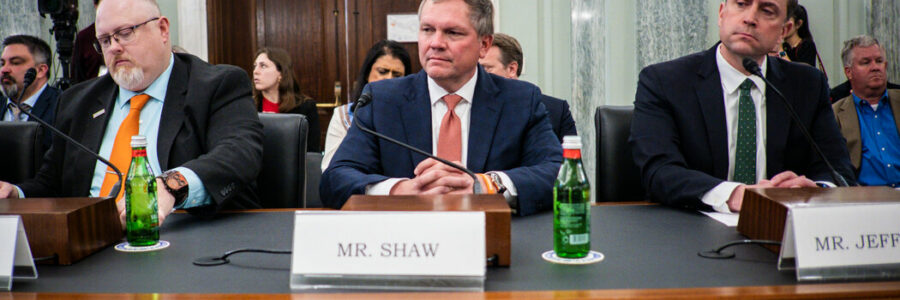
Norfolk Southern to Provide Financial Support After Derailment, C.E.O. Says
WASHINGTON — The chief executive of Norfolk Southern told Congress on Wednesday that his company would create programs to provide long-term financial support to residents of East Palestine, Ohio, where one of its trains carrying hazardous materials careened off the tracks seven weeks ago and ignited a fire.
Alan H. Shaw, the chief executive, told the Senate Commerce Committee that the company was planning to create a medical compensation fund to address long-term health risks after the accident and a property value assurance program. The commitments, made during a hearing to scrutinize the derailment and regulatory changes that could prevent similar accidents in the future, came as Norfolk Southern has been under intense pressure from lawmakers in both parties to do more to support the community of East Palestine.
Under questioning from members of the panel, Mr. Shaw also said he supported aspects of a bipartisan bill introduced after the derailment that would tighten rail regulations, including strengthening notification and inspection requirements for trains carrying hazardous materials and increasing fines for safety violations by rail carriers.
“We support legislative efforts that use science and data to enhance the safety of the freight rail industry,” Mr. Shaw said.
However, not every witness shared Mr. Shaw’s support for the stricter regulations.
Ian Jefferies, the chief executive of the Association of American Railroads, argued in written testimony that the industry had prioritized rail safety investments and that the legislation would place “excessive and unnecessary operational burdens” on the industry.
The Train Derailment in Ohio
When a Norfolk Southern train derailed in East Palestine, Ohio, on Feb. 3, it set off evacuation orders, a toxic chemical scare and a federal investigation.
Senator J.D. Vance of Ohio, the lead Republican behind the bill, called out the railroad industry for opposing it.
“To the rail industry: Don’t lie about my bill. Don’t slander the staff who drafted it,” Mr. Vance said.
Senator Edward J. Markey, Democrat of Massachusetts, said he was “sick of industry experts talking about supporting the principles of regulation, while they lobby against common-sense regulations like this one behind the scenes,” in response to unsatisfactory answers from Mr. Shaw regarding the extent of his support for the legislation.
While three Senate Republicans co-sponsored the bill when it was first introduced, it remains unclear whether it has enough support to advance in the closely divided Senate, where most major legislation needs 60 votes to move forward, or whether the measure could draw support in the Republican-led House.
“One of the things that I’ve heard in response to our legislation, and that is that it actually has nothing to do with what happened in East Palestine,” Mr. Vance said. “Say it to the firefighters who went into a chemical fire without proper hazmat protection, because they didn’t know what was on the train. This legislation fixes that problem, as it should.”
But Mr. Shaw said his company backed the proposed changes, including stricter standards for freight car safety, better real-time information for emergency medical workers about the contents in the trains that are moving through their communities, and requirements to phase out older tank car models and develop better early-warning sensor technologies and advanced tank car design.
According to a National Transportation Safety Board report, a wheel bearing on one of the cars had been heating up on the train that derailed in East Palestine, but no alarm sounded to alert the crew until it passed a sensor not far from where it derailed. Safety experts believe the derailment could have been averted had Norfolk Southern placed the detectors closer together on the route the train took.
The N.T.S.B. opened a special investigation into the company’s safety practices this month. Since December 2021, Norfolk Southern had suffered five significant accidents, and another derailment occurred hours before a Senate Environment and Public Works Committee hearing this month.
Senator Ted Cruz, Republican of Texas, questioned why Norfolk Southern did not stop the train immediately after a sensor showed that the wheel was overheating.
Mr. Shaw responded that the temperature measured by an intermediary sensor was not high enough by the company’s standards to stop the train. He said the company has since lowered the benchmark from 200 degrees over ambient temperature to 170 degrees.
On Capitol Hill on Wednesday, Clyde Whitaker, the Ohio state legislative director for the transportation labor union SMART Transportation Division, said he filed a complaint with the Federal Railroad Administration in July about an unsafe practice at Norfolk Southern.
According to Mr. Whitaker, the company instructed crews to disregard failures of wayside detectors, which monitor the temperature of rail car parts.
“This meant that the trains were not being inspected as intended, and that the crews were not able to ascertain the integrity of their trains,” Mr. Whitaker said.
He also criticized the company’s practice of precision scheduled railroading, which involves cutting back on rail yard workers, inspectors and equipment to adhere to stricter train schedules to maximize profits.
Source: Read Full Article